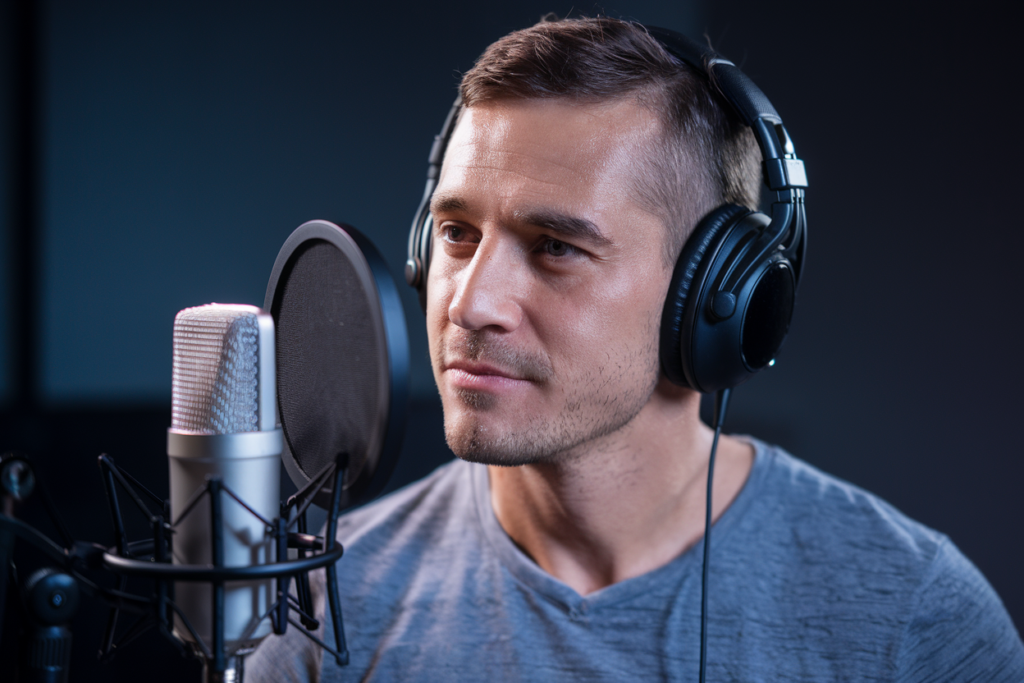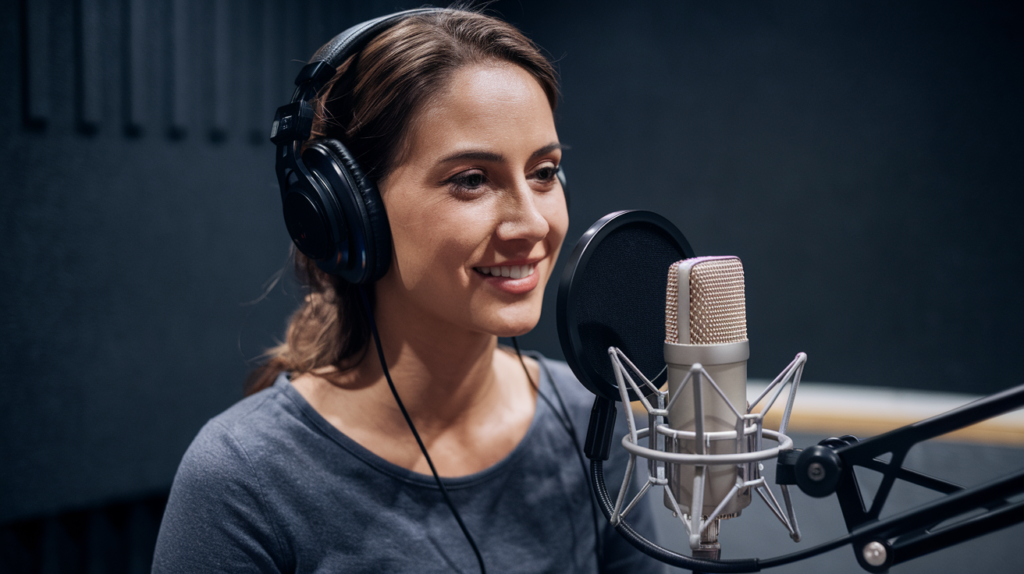Key Takeaways
- Language Nuances: Mastering the subtleties of Romanian, including intonation and regional dialects, is crucial for delivering authentic voiceovers.
- Cultural Understanding: Familiarity with Romanian cultural references, idioms, and humor enhances relatability and engagement in voice acting.
- Technical Consistency: Access to quality recording equipment varies significantly in Romania, impacting sound quality and overall performance.
- Increasing Competition: The demand for Romanian voiceovers has led to heightened competition; developing a unique style or niche is essential for differentiation.
- Training Importance: Quality training programs that focus on local language nuances are vital for aspiring voice actors to refine their skills effectively.
- Cultural Representation: Understanding local cultural influences can enhance project authenticity and emotional resonance in audio-visual media.
Ever wondered why voice acting in Romanian can be so challenging? Whether you’re a budding talent or a seasoned pro, navigating the nuances of this beautiful language can feel like an uphill battle. From mastering intonation to understanding cultural references, the hurdles are real and often leave you scratching your head.
Voice Acting Difficulties in Romania
Voice acting in Romania presents unique challenges for both newcomers and seasoned voice actors. Understanding these difficulties helps you appreciate the intricacies of this craft.
Language Nuances
Romanian is a rich language, filled with intonations and expressions that might not translate directly into other languages. Mastering these subtleties can pose a significant hurdle for voice talent aiming to convey emotions authentically. You’ll need to pay attention to regional dialects, which vary widely across the country, adding another layer of complexity.
Cultural References
Cultural context plays a crucial role in voiceovers. Romanian culture includes specific idioms, humor, and references that resonate with native speakers. A voice over actor must grasp these elements to create relatable and engaging content. If you’re unfamiliar with local customs or sayings, your performance may miss the mark.
Technical Challenges
The technical aspects of recording can also be daunting. Access to high-quality recording equipment varies significantly in Romania. While some artists have state-of-the-art setups, others may rely on basic tools that don’t do justice to their talent. This inconsistency can affect sound quality across various projects.
Competition Level
The growing demand for Romanian voiceovers has led to increased competition among voice artists. As more individuals enter the field, differentiating your skills becomes crucial. You’ll want to develop a unique style or niche that sets you apart from other voice over talents.
Navigating these difficulties requires dedication and continuous learning as a voice artist in Romania. Embracing challenges ultimately strengthens your abilities and enhances your overall performances.
Common Challenges Faced by Voice Actors
Voice actors encounter various challenges that can affect their performances and career growth. Understanding these obstacles helps you navigate the voiceover industry more effectively.
Language Barriers
Language barriers often pose significant challenges for voice artists, particularly in a linguistically rich environment like Romania. If you’re not fluent in Romanian or unfamiliar with its nuances, delivering authentic voiceovers becomes tricky. Mispronunciations or incorrect intonations can undermine your credibility. Even subtle differences in phrasing may lead to misunderstandings in emotional delivery. Therefore, mastering the language is crucial to connect with your audience genuinely.
Accent and Dialect Variations
Accent and dialect variations further complicate the landscape for voice actors. Romania boasts diverse regional accents that influence how messages are perceived. If you’re aiming to convey authenticity in your work, adapting to these variations is essential. Failing to recognize local dialects can alienate listeners who expect relatable content from a voice over artist familiar with their speech patterns. Embracing accent training and actively listening to native speakers enhances your versatility as a voice over talent, allowing you to engage wider audiences effectively.
Understanding these common challenges empowers you as a voice actor to refine your skills continually and enhance your marketability within the competitive realm of voiceovers.
Industry Standards and Expectations
Voice acting in Romania comes with specific industry standards and expectations that aspiring voice artists need to navigate. Understanding these nuances can significantly enhance your chances of success.
Quality of Training Programs
Quality training programs play a crucial role in shaping skilled voice actors. Many institutions offer specialized courses tailored for the Romanian market, focusing on vocal techniques, pronunciation, and emotional expression. Accentuating local culture and dialects is essential; therefore, comprehensive training covers regional variations to help you connect authentically with audiences. Engaging with seasoned professionals through workshops or online resources enhances your understanding of industry standards while refining your unique voiceover talent.
Competition in the Field
The competition among voice artists in Romania has intensified as demand rises across various media platforms. With a growing number of talented individuals vying for roles, establishing a distinct style sets you apart from others. Emphasizing versatility—whether through accents or genres—can elevate your profile within this competitive landscape. Staying updated on trends within the industry also helps you adapt your skills accordingly, ensuring you’re always relevant when opportunities arise. Remember, cultivating a niche can attract clients seeking specific qualities in their voiceover projects.
Cultural Influences on Voice Acting
Cultural influences play a significant role in shaping the voice acting landscape in Romania. Understanding these aspects can enhance your project’s authenticity and emotional resonance.
Representation in Audio-Visual Media
Representation matters. Romanian audio-visual media often reflects local culture, humor, and societal norms. When selecting a voice actor, consider how their understanding of cultural nuances can elevate your project’s relatability. A voice artist who grasps the subtleties of regional dialects or idioms adds depth to characters, ensuring they resonate with audiences. This connection is crucial for creating compelling narratives that engage listeners.
Impact of Local Productions
Local productions shape the skills and styles of voiceover talent in Romania. They frequently highlight traditional stories, folklore, and contemporary issues that resonate with viewers. By engaging with these themes, a voice over artist develops distinct vocal qualities that reflect cultural identity. Collaborating with such talent not only enriches your project but also enhances its appeal to a broad audience base familiar with those cultural references.
Investing time in understanding these cultural elements will undoubtedly strengthen your project’s impact while supporting local talent’s growth within the competitive landscape of voice acting.
Conclusion
Navigating the voice acting landscape in Romania presents unique challenges that require dedication and adaptability. By mastering the intricacies of the Romanian language and its regional dialects you can enhance your emotional expression and authenticity. Embracing cultural nuances will not only improve your delivery but also resonate with your audience on a deeper level.
Investing in quality training and staying updated on industry trends is vital for success in this competitive field. Whether you’re just starting or looking to refine your skills remember that continuous learning is key. Focus on developing a distinct style while remaining versatile to stand out from the crowd. With perseverance you’ll find opportunities to thrive as a voice artist in Romania’s vibrant market.
Frequently Asked Questions
What are the main challenges faced by voice actors in Romania?
Voice actors in Romania face several challenges, including mastering intonation, understanding cultural references, and dealing with regional dialects. These factors can complicate authentic emotional expression and hinder effective communication. Additionally, newcomers may struggle with technical issues related to recording equipment and sound quality.
Why is language mastery important for voice acting?
Language mastery is crucial for delivering authentic performances in Romanian voice acting. Mispronunciations or incorrect intonations can undermine credibility, making it essential for voice artists to be fluent and familiar with the nuances of the language to connect genuinely with their audience.
How do regional accents affect voice acting in Romania?
Romania’s diverse regional accents significantly influence how messages are perceived. Voice actors must adapt to these variations to ensure authenticity. Embracing accent training can enhance versatility and help artists deliver relatable content that resonates well with different audiences.
What role does cultural context play in voice acting?
Cultural context is vital for creating relatable content in Romanian voice acting. Familiarity with local idioms, humor, and societal norms enhances a project’s authenticity and emotional resonance. Understanding these elements allows voice artists to connect more deeply with their audience.
How can aspiring voice actors improve their skills?
Aspiring voice actors should consider enrolling in quality training programs that focus on vocal techniques, pronunciation, and emotional expression tailored to local culture. Engaging with seasoned professionals through workshops or online resources can further refine their talents and industry knowledge.
What strategies can help a voice artist stand out in a competitive market?
To stand out in Romania’s competitive market, voice artists should develop a unique style or niche while emphasizing versatility. Staying updated on industry trends and cultivating specific qualities sought by clients will enhance marketability and relevance within the evolving landscape of voice acting.
How do local productions influence Romanian voice acting?
Local productions shape the Romanian voice acting landscape by reflecting traditional stories and contemporary issues relevant to society. This connection helps artists develop distinct vocal qualities that resonate well with audiences while supporting the growth of local talent within the industry.







